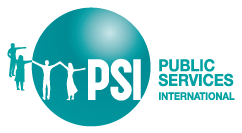The ASU recognises that many local industrial issues have antecedents in other nations. We also know that globalisation means that the labour standards of workers in other countries can, and do, impact the labour standards of Australian workers.
As a result, the ASU is involved through various means with international labour organisations. We keep abreast of international issues to ensure that ASU members are protected.
In some areas of international activity, the ASU is involved to support the rights of people overseas. Through Union Aid Abroad-APHEDA, an arm of the ACTU, Australian unions are involved in charitable activities.
The Australian Services Union along with the ACTU and other unions are opposing a number of aspects of the China-Australia Free Trade Agreement (ChAFTA). The Agreement is yet to be passed by the Australian Parliament, although it has already been signed by the Federal Minister for Trade and Investment Andrew Robb. In addition to unions, other community based organisations, fair trade groups and other sections of civil society have expressed strong opposition to the ChAFTA for various reasons.
Learn about the ASU's concerns here: China-Australia Free Trade Agreement - not in the national interest
Resources with further info and to help spread the word:
 ASU-ChAFTA fact sheet, Sept 2015
ASU-ChAFTA fact sheet, Sept 2015 ASU-ChAFTA flyer, Sept 2015
ASU-ChAFTA flyer, Sept 2015 ASU-ChAFTA conversation notes, Sept 2015
ASU-ChAFTA conversation notes, Sept 2015 ASU-ChAFTA workplace resolution, Sept 2015
ASU-ChAFTA workplace resolution, Sept 2015 ASU-ChAFTA petition, Sept 2015
ASU-ChAFTA petition, Sept 2015
 From the UAA-APHEDA website:
From the UAA-APHEDA website:
Australian People for Health, Education and Development Abroad (APHEDA) was created in 1984 as the overseas aid agency of the Australian Council of Trade Unions.
Union Aid Abroad-APHEDA was established to contribute directly to countries and regions of the world where men and women workers are disadvantaged through poverty, a lack of workplace, denial of labour and human rights, civil conflict and war.
Union Aid Abroad is committed to justice and solidarity and to self reliance, not charity. It builds self-reliance through support to educational and training projects for workers and their organisatons in Southeast Asia, the Pacific, the Middle East, Southern Africa and the Caribbean.
Union Aid Abroad-APHEDA is supported by individual union members, the ACTU, unions, workplaces, AusAID and the Australian public.
Union Aid Abroad - APHEDA is an Incorporated Association (Y1103419) and endorsed as a deductible gift recipient with the Australian Taxation Office, (ABN 76 425 451 089). Donations of $2 or more to the "APHEDA Overseas Project Fund" are tax deductible. Union Aid Abroad - APHEDA is fully accredited with the Australian Government's overseas aid agency, AusAID, and is a signatory to the Australian Council for International Development's Code of Conduct.
Global Unions represent workers in the industries they cover on the international stage. They do this by promoting particular workplace campaigns of major significance, thereby generating international activism and also by working on policy and strategy that can be employed with employers and governments. As a result of our industry and occupational coverage, the ASU is affiliated to PSI, UNI and ITF.
 From the PSI website:
From the PSI website:
Public Services International brings together more than 20 million workers, represented by 650 unions in 148 countries and territories. We are a global trade union federation dedicated to promoting quality public services in every part of the world. Our members, two-thirds of whom are women, work in social services, health care, municipal and community services, central government, and public utilities such as water and electricity.
What we do:
We support local and regional campaigns. We work closely with affiliated unions to promote free collective bargaining, to protect workers' rights, and to fight for gender equality, equity and dignity for all.
PSI supports affiliated unions through union development projects to build both on-the-ground capacity and international solidarity. This is especially important in countries where workers must fight for recognition of their unions.
PSI presents the case for quality public services in many forums. These include the International Labour Organisation and other United Nations bodies, the World Bank and regional development banks, the International Monetary Fund, the World Trade Organisation, the Organisation for Economic Co-operation and Development and many others.
Public Services International campaigns to achieve:
- Social justice
- Quality public services for all
- Poverty reduction and debt relief
- Gender equality and employment equity
- Free collective bargaining
- A strong and united union movement
 From the UNI website:
From the UNI website:
UNI is the skills and services international launched on January 1, 2000. We are a new global union for a new millennium and a new economy. We are part of the trade union response to increasing economic regionalisation and globalisation and to the convergence of what were, in the past, separate industries.
The job of a global union is to help affiliated unions and their members to put people first in this increasingly globalised economy. UNI encourages solidarity across borders, raises issues of common concern with employers, governments and international bodies - and promotes trade union rights worldwide.
UNI has more than 900 affiliated unions in 140 countries around the world, representing more than 15 million members.
UNI is a global organisation that talks to multi-national employers, to international organisations, to governments, to employer groups and to other trade union organisations.
 From the ITF website:
From the ITF website:
The International Transport Workers' Federation (ITF) is a truly global organisation. It is a federation of 621 transport trade unions in 137 countries, representing around 5 million workers.
The ITF was founded in 1896 in London by European seafarers' and dockers' union leaders who realized the need to organise internationally against strike breakers. Today the ITF organises workers in ships, ports, railways, road freight and passenger transport, inland waterways, fisheries, tourism and civil aviation.
The ITF represents transport workers at world level and promotes their interests through global campaigning and solidarity. It is dedicated to the advancement of independent and democratic trade unionism, and to the defence of fundamental human and trade union rights. It is opposed to any form of totalitarianism, aggression and discrimination.
 From the ITUC website:
From the ITUC website:
The International Trade Union Confederation (ITUC) is the global voice of the world's working people.
The ITUC's primary mission is the promotion and defence of workers' rights and interests, through international cooperation between trade unions, global campaigning and advocacy within the major global institutions.
Its main areas of activity include the following: trade union and human rights; economy, society and the workplace; equality and non-discrimination; and international solidarity.
The ITUC adheres to the principles of trade union democracy and independence. It is governed by four-yearly world congresses, a General Council and an Executive Bureau.
The ITUC regional organisations are the Asia-Pacific Regional Organisation (ITUC-AP), the African Regional Organisation (ITUC-AF) and the American Regional Organisation (TUCA). It cooperates with the European Trade Union Confederation, including through the Pan-European Regional Council.
The ITUC has close relations with the Global Union Federations and the Trade Union Advisory Committee to the OECD (TUAC). It works closely with the International Labour Organisation and with several other UN Specialised Agencies.
 From the ILO website:
From the ILO website:
The International Labour Organization (ILO) is devoted to promoting social justice and internationally recognized human and labour rights, pursuing its founding mission that labour peace is essential to prosperity. Today, the ILO helps advance the creation of decent work and the economic and working conditions that give working people and business people a stake in lasting peace, prosperity and progress. Its tripartite structure provides a unique platform for promoting decent work for all women and men. Its main aims are to promote rights at work, encourage decent employment opportunities, enhance social protection and strengthen dialogue on work-related issues.
The ILO has four strategic objectives
- Promote and realize standards and fundamental principles and rights at work
- Create greater opportunities for women and men to decent employment and income
- Enhance the coverage and effectiveness of social protection for all
- Strengthen tripartism and social dialogue

